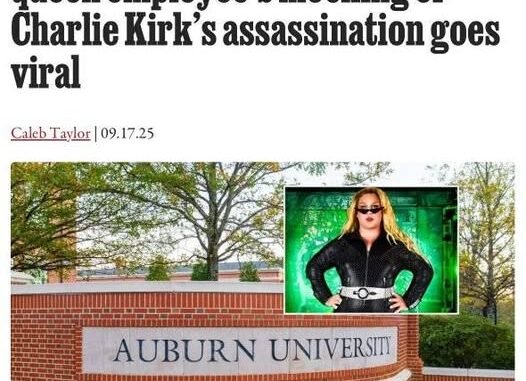
Auburn University Terminations Spark Debate Over Free Speech and Institutional Values
In a shocking development that has sent ripples through the academic world and the ongoing national debate over free speech, Auburn University has terminated multiple employees after a viral video surfaced showing them, in drag, making light of the recent assassination of conservative activist Charlie Kirk. The decision, which was confirmed by the university, comes amidst a wider trend of disciplinary actions against individuals across various sectors for what employers have deemed “inappropriate” and “callous” online comments regarding Kirk’s death.
The Viral Video and the Fallout
The video, which circulated widely on social media platforms, showed a group of individuals in full drag, appearing to mock and celebrate the assassination of Charlie Kirk. While the exact context of the video and the comments made within it have been a source of debate, the overall message was widely interpreted as insensitive and celebratory. The video quickly gained traction, and within hours, social media users, including conservative commentators, began tagging Auburn University, demanding action.
The university, which had already been in the spotlight for hosting a prayer vigil for Kirk just days earlier, was quick to respond. A statement released by the university president confirmed that the individuals in the video were employees and that their actions were “unacceptable” and “not reflective of the values of Auburn University.” The statement went on to say that the employees’ comments “promoted violence” and were in “direct violation of our code of conduct.”
The decision to terminate the employees, which was made swiftly, has been met with both support and condemnation. Supporters of the move argue that the employees’ comments, regardless of their political views, crossed a line and that celebrating the death of any public figure is beyond the pale. They point to the fact that the individuals were not just expressing a political opinion but were actively mocking a tragic and violent event. They also highlight the need for universities to maintain a safe and respectful environment for all students and staff, and that comments of this nature create a hostile atmosphere.
The Broader Context: A National Trend
The firings at Auburn are not an isolated incident but rather part of a larger, national trend. In the days following Kirk’s assassination, dozens of individuals across the country have faced disciplinary action from their employers for similar comments. From teachers and university professors to corporate employees and journalists, the backlash has been swift and severe.
- A teacher in Virginia was fired for posting, “I hope he suffered through all of it.”
- An assistant dean at a Tennessee college was terminated for “inappropriate and callous comments.”
- An employee at the University of Mississippi was fired for sharing an “insensitive” social media post.
These actions, many of which were amplified by conservative politicians and activists, have sparked a fierce debate about free speech and the limits of online expression. Civil liberties groups have warned that these punishments could amount to intimidation and have a chilling effect on expression across society. They argue that while the comments are distasteful, employees have a right to their own opinions, and that employers should not be able to fire them for expressing those opinions outside of the workplace.
However, many employers and universities have countered that they have a right and a responsibility to protect their reputation and to ensure a civil and professional workplace. They argue that when an employee’s public comments are seen as representing the organization, and those comments are offensive or promote violence, the organization has a right to take action.
The Future of Free Speech on Campus
The events at Auburn University highlight the growing tension between an individual’s right to free speech and an organization’s need to maintain a code of conduct. This is particularly relevant on college campuses, which are often seen as bastions of free expression but are also expected to provide a safe and inclusive environment for all. The firings at Auburn, and the larger national trend, are a sign that this tension is reaching a breaking point.
While the specifics of the Auburn case, with the involvement of drag queens and a political assassination, are unique, the underlying issue is not. This will undoubtedly not be the last time a university or a company has to grapple with an employee’s online comments. The line between what is acceptable and what is not is becoming increasingly blurred, and the fallout, as seen at Auburn University, can be swift and severe.
Leave a Reply